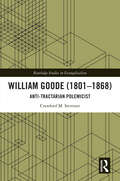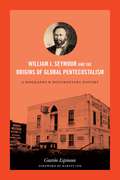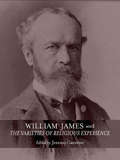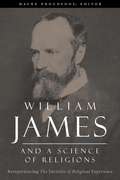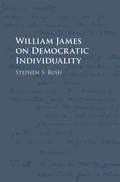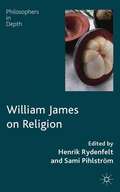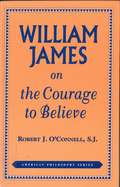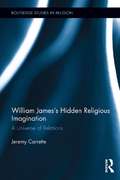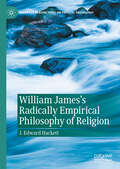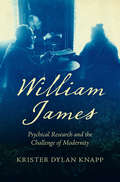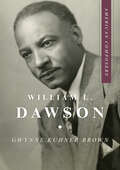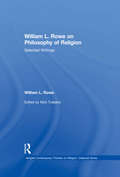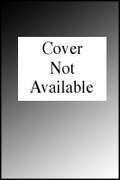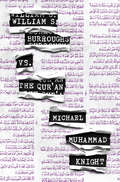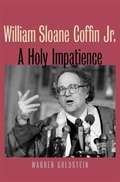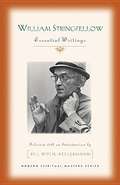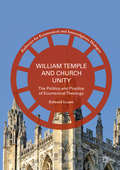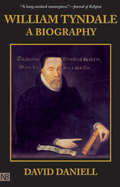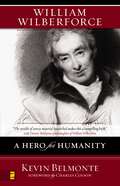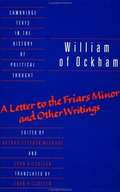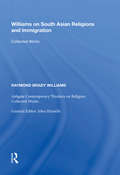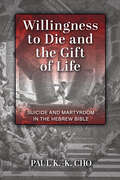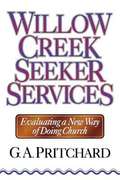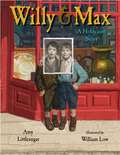- Table View
- List View
William Goode: Anti-Tractarian Polemicist (Routledge Studies in Evangelicalism)
by Crawford M. StevenerThis book examines the theology of William Goode (1801-1868), a leading Church of England theological polemicist in the nineteenth century.During exceedingly turbulent periods for the Church of England, William Goode was the foremost historical scholar who consistently rose to the occasion to write in defence of the church’s reformed and protestant nature. His position as the pre-eminent refuter of Tractarian theology is developed and interpreted contextually in this volume. Through a meticulous reading of all of Goode’s original works, relevant Victorian newspapers and journals, as well as surviving manuscript evidence, a full picture of Goode’s theology in his nineteenth-century context is delineated. Goode’s writing on successive doctrinal topics is examined in the context of theological crises besieging the Church of England and analysis of his corpus is demonstrated to be important for considering both reactions to the Oxford Movement and Anglican evangelical theology. The chapters consider Goode’s role in ecclesiastical judicial settings, his defence of the Protestant nature of the Church of England as legally established in the Reformation, and his evangelical Anglican interpretation of the English formularies.This book is valuable reading for scholars of Church history and religious history, particularly those with an interest in the Oxford Movement, Anglicanism, Evangelicalism, and the Reformation.
William J. Seymour and the Origins of Global Pentecostalism: A Biography and Documentary History
by Gastón EspinosaIn 1906, William J. Seymour (1870-1922) preached Pentecostal revival at the Azusa Street mission in Los Angeles. From these and other humble origins the movement has blossomed to 631 million people around the world. Gastón Espinosa provides new insight into the life and ministry of Seymour, the Azusa Street revival, and Seymour's influence on global Pentecostal origins. After defining key terms and concepts, he surveys the changing interpretations of Seymour over the past 100 years, critically engages them in a biography, and then provides an unparalleled collection of primary sources, all in a single volume. He pays particular attention to race relations, Seymour's paradigmatic global influence from 1906 to 1912, and the break between Seymour and Charles Parham, another founder of Pentecostalism. Espinosa's fragmentation thesis argues that the Pentecostal propensity to invoke direct unmediated experiences with the Holy Spirit empowers ordinary people to break the bottle of denominationalism and to rapidly indigenize and spread their message.The 104 primary sources include all of Seymour's extant writings in full and without alteration and some of Parham's theological, social, and racial writings, which help explain why the two parted company. To capture the revival's diversity and global influence, this book includes Black, Latino, Swedish, and Irish testimonies, along with those of missionaries and leaders who spread Seymour's vision of Pentecostalism globally.
William James and The Varieties of Religious Experience: A Centenary Celebration
by Jeremy CarretteWilliam James's The Varieties of Religious Experience was an intellectual landmark, paving the way for current study of psychology, philosophy and religious studies. In this new companion to the Varieties, key international experts provide contemporary responses to James's book, exploring its seminal historical importance and its modern significance. Locating the Varieties within the context of James's other works and exploring James's views on psychology, mysticism, religious experience, emotion and truth, the sixteen articles offer new analyses of the Varieties from the perspectives of postcolonial theory, history, social theory and philosophy. As the only critical work dedicated to the cross-disciplinary influence of The Varieties of Religious Experience, this book testifies to William James's genius and ongoing legacy.
William James and a Science of Religions: Reexperiencing The Varieties of Religious Experience (Columbia Series in Science and Religion)
by Wayne ProudfootThe "science of religion" is an important element in the interpretation of William James's work and in the methodology of the study of religion. An authority on pragmatism and the philosophy of religion, Wayne Proudfoot and a stellar group of contributors from a variety of disciplines including religion, philosophy, psychology, and history, bring innovative perspectives to James's work. Each contributor focuses on a specific theme in The Varieties of Religious Experience and suggests how James's treatment of that theme can fruitfully be brought to bear, sometimes with revisions or extensions, on current debate about religious experience.
William James on Democratic Individuality
by Bush Stephen S.William James (1842-1910) argued for a philosophy of democracy and pluralism that advocates individual and collective responsibility for our social arrangements, our morality, and our religion. In James' view, democracy resides first and foremost not in governmental institutions or in procedures such as voting, but rather in the characteristics of individuals, and in qualities of mind and conduct. It is a philosophy for social change, counselling action and hope despite the manifold challenges facing democratic politics, and these issues still resonate strongly today. In this book, Stephen Bush explores how these themes connect to James' philosophy of religion, his moral thought, his epistemology, his psychology, and his metaphysics. His fresh and original study highlights the relevance of James' thought to modern debates, and will appeal to scholars and students of moral and political philosophy.
William James on Ethics and Faith
by Michael R. SlaterThis book offers a new interpretation of William James's ethical and religious thought. Michael Slater shows that James's conception of morality, or what it means to lead a moral and flourishing life, is intimately tied to his conception of religious faith, and argues that James's views on these matters are worthy of our consideration. He offers a reassessment of James's 'will to believe' or 'right to believe' doctrine, his moral theory, and his neglected moral arguments for religious faith. And he argues that James's pragmatic account of religion is based on an ethical view of the function of religion and a realist view of the objects of religious belief and experience, and is compatible with his larger conception of pragmatism. The book will appeal to readers interested in the history of modern philosophy, especially pragmatism, as well as those interested in moral philosophy, religion, and the history of ideas.
William James on Religion
by Henrik Rydenfelt Sami PihlströmA team of international experts present a collection of articles on William James's philosophy of religion and its current relevance. A new look at his philosophy of religion is crucially important for the development of this field of inquiry today.
William James on the Courage to Believe (American Philosophy)
by Robert J. O'ConnellWilliam James’ celebrated lecture on “The Will to Believe” has kindled spirited controversy since the day it was delivered. In this lively reappraisal of that controversy, Father O’Connell contributes some fresh contentions: that James’ argument should be viewed against his indebtedness to Pascal and Renouvier; that it works primarily to validate our “over-beliefs” ; and most surprising perhaps, that James envisages our “passional nature” as intervening, not after, but before and throughout, our intellectual weighing of the evidence for belief.
William James's Hidden Religious Imagination: A Universe of Relations (Routledge Studies in Religion)
by Jeremy CarretteThis book offers a radical new reading of William James’s work on the idea of ‘religion.’ Moving beyond previous psychological and philosophical interpretations, it uncovers a dynamic, imaginative, and critical use of the category of religion. This work argues that we can only fully understand James’s work on religion by returning to the ground of his metaphysics of relations and by incorporating literary and historical themes. Author Jeremy Carette develops original perspectives on the influence of James’s father and Calvinism, on the place of the body and sex in James, on the significance of George Eliot’s novels, and Herbert Spencer’s ‘unknown,’ revealing a social and political discourse of civil religion and republicanism and a poetic imagination at the heart of James understanding of religion. These diverse themes are brought together through a post-structural sensitivity and a recovery of the importance of the French philosopher Charles Renouvier to James’s work. This study pushes new boundaries in Jamesian scholarship by reading James with pluralism and from the French tradition. It will be a benchmark text in the reshaping of James and the nineteenth-century foundations of the modern study of ‘religion.’
William James's Radically Empirical Philosophy of Religion (Palgrave Perspectives on Process Philosophy)
by J. Edward HackettThis book takes a stand against and critiques readings of William James that do not pay attention to the metaphysics of experience. Such interpretations overlook the first mentions of radical empiricism in James’s Will to Believe argument. By attending to James's metaphysics of experience, this book argues that James’s universe is a “quasi-chaos” of becoming in our relations with nature and other people, so that things independent of us relate, evolve, and change in space and time. James’s metaphysics of relations is what unifies his various psychological, poetic, mystical, and religious commitments. These metaphysical implications have consequences for how James understood what metaphysics can do in philosophy, how it relates to theology, what we can say about his will-to-believe argument, mysticism, free-will, God’s finitism, the problem of One and the Many, and panpsychism.
William James: Psychical Research and the Challenge of Modernity
by Krister Dylan KnappIn this insightful new book on the remarkable William James, the American psychologist and philosopher, Krister Dylan Knapp provides the first deeply historical and acutely analytical account of James's psychical research. While showing that James always maintained a critical stance toward claims of paranormal phenomena like spiritualism, Knapp uses new sources to argue that psychical research held a strikingly central position in James's life. It was crucial to his familial and professional relationships, the fashioning of his unique intellectual disposition, and the shaping of his core doctrines, especially the will-to-believe, empiricism, fideism, and theories of the subliminal consciousness and immortality.Knapp explains how and why James found in psychical research a way to rethink the well-trodden approaches to classic Euro-American religious thought, typified by the oppositional categories of natural vs. supernatural and normal vs. paranormal. He demonstrates how James eschewed these choices and instead developed a tertiary synthesis of them, an approach Knapp terms tertium quid, the third way. Situating James's psychical research in relation to the rise of experimental psychology and Protestantism's changing place in fin de siecle America, Knapp asserts that the third way illustrated a much broader trend in transatlantic thought as it struggled to navigate the uncertainties and religious adventurism of the modern age.
William L. Dawson (American Composers)
by Gwynne Kuhner BrownWilliam L. Dawson is recognized for his genre-defining choral spirituals and for his Negro Folk Symphony, a masterpiece enjoying a twenty-first-century renaissance. Gwynne Kuhner Brown’s engaging and tirelessly researched biography reintroduces a musical leader whose legacy is more important today than ever. Born in 1899, Dawson studied at the Tuskegee Institute in Alabama. He worked as a church, jazz, and orchestral musician in Kansas City and Chicago in the 1920s while continuing his education as a composer. He then joined the Tuskegee faculty, where for 25 years he led the Tuskegee Institute Choir to national prominence through performances of spirituals at the opening of Radio City Music Hall, on radio and television, and at the White House. The Philadelphia Orchestra conducted by Leopold Stokowski premiered Dawson’s Negro Folk Symphony in 1934. Engaging and long overdue, William L. Dawson celebrates a pioneering Black composer whose contributions to African American music, history, and education inspire performers and audiences to this day.
William L. Rowe on Philosophy of Religion: Selected Writings (Ashgate Contemporary Thinkers on Religion: Collected Works)
by William L. Rowe Nick TrakakisWilliam Rowe is one of the leading thinkers in contemporary philosophy of religion. Although he is best known for his contributions to the problem of evil, he has produced innovative and influential work across a wide array of subjects at the interface between philosophy and religion. He has, for example, written extensively on the existentialist theologian, Paul Tillich, on the challenging problem of divine freedom, and on the traditional arguments in support of the existence of God. His work in these areas is distinguished by its clarity, rigour, originality, and sensitivity towards the claims of his theistic opponents. Indeed, Rowe's work has played a pivotal role in the remarkable revival of analytic philosophy of religion since the 1970s. The present collection brings together for the first time Rowe's most significant contributions to the philosophy of religion. This diverse but representative selection of Rowe's writings will provide students, professional scholars as well as general readers with stimulating and accessible discussions on such topics as the philosophical theology of Paul Tillich, the problem of evil, divine freedom, arguments for the existence of God, religious experience, life after death, and religious pluralism.
William Penn: A Radical, Conservative Quaker
by J. William FrostWhile many recognize William Penn as the founder of Pennsylvania and a defender of religious liberty, much less is known about Penn as a man of faith. This wide-ranging history examines Penn as a deeply religious man who experienced personal triumph and success as well as tragedy and failure.After an introduction to Penn and his times, J. William Frost explores various aspects of Penn’s faith, including his conversion, service within the Society of Friends, moral teachings, and advocacy for toleration in England and religious freedom in Pennsylvania. He examines Penn as a figure whose contradictions reflect, at least in part, his turbulent times. Penn was a radical who converted to an outlawed religion and sought to transform English society, but he was also a conservative who supported monarchical authority in England and demanded deference in Pennsylvania. Penn was born under Puritanism and lived through three revolutions, five wars, and decades of religious turmoil. He died in the Age of Enlightenment, having gone from leader and shaper of the Society of Friends to king’s courtier to a prisoner accused of treason (though he was eventually exonerated).This intriguing history fills significant gaps in writings about Penn—particularly concerning Penn’s faith and its intersection with his work as a statesman and politician. It will be of interest to those interested in William Penn, the history of Quakerism, and the history of religion in America.
William S. Burroughs vs. The Qur'an
by Michael Muhammad KnightWhen Michael Muhammad Knight sets out to write the definitive biography of his "Anarcho-Sufi" hero and mentor, writer Peter Lamborn Wilson (aka Hakim Bey), he makes a startling discovery that changes everything. At the same time that he grows disillusioned with his idol, Knight finds that his own books have led to American Muslim youths making a countercultural idol of him, placing him on the same pedestal that he had given Wilson.In an attempt to forge his own path, Knight pledges himself to an Iranian Sufi order that Wilson had almost joined, attempts to write the Great American Queer Islamo-Futurist Novel, and even creates his own mosque in the wilderness of West Virginia. He also employs the "cut-up" writing method of Bey's friend, the late William S. Burroughs, to the Qur'an, subjecting Islam's holiest scripture to literary experimentation.William S. Burroughs vs. the Qur'an is the struggle of a hero-worshiper without heroes and the meeting of religious and artistic paths, the quest of a writer as spiritual seeker.
William Sloane Coffin Jr.: A Holy Impatience
by Warren GoldsteinA magnet for controversy, the media, and followers, the Rev. William Sloane Coffin Jr. was the premier voice of northern religious liberalism for more than a quarter-century, and a worthy heir to the Rev. Martin Luther King Jr. From his pulpits at Yale University and, later, New York City's Riverside Church, Coffin focused national attention on civil rights, the anti-Vietnam War movement, disarmament, and gay rights. This revealing biography-based on unparalleled access to family papers and candid interviews with Coffin, his colleagues, family, friends, lovers, and wives-tells for the first time the remarkable story of Coffin's life. An army and CIA veteran before assuming the post of Yale University chaplain at the youthful age of 33, Coffin gained notoriety as a leader of a dangerous civil rights Freedom Ride in 1961, as a defendant in the "Boston Five" trial of draft resisters in 1969, and as the preeminent voice of liberal religious dissent into the 1980s. This book encompasses Coffin's turbulent private life as well as his flamboyant, joyful public career, while dramatically illuminating the larger social movements that consumed his days and defined his times.
William Stringfellow: Essential Writings
by William StringfellowWilliam Stringfellow (1928-1985) was a radical lay theologian and social critic. Rooted in biblical warnings against powers and principalities, he leveled a prophetic critique against a range of institutions the church, seminaries, economic structures, and the idolatries of the modern war-making state. Trained as a lawyer, he was a lifelong gadfly in the Episcopal church. His great theme was the Constantinian compromise, the accommodation of Christianity to the values of the empire and the preservation of the status quo. His writings retain their relevance and critical bite.
William Temple and Church Unity
by Edward LoaneThis book evaluates William Temple's theology and his pursuit of church unity. It exposes a number of paradoxes and conflicts that have generally gone under-appreciated in assessments of Temple. William Temple was one of the most outstanding leaders of the early ecumenical movement. In many ways his ecumenical efforts provided a paradigm others have looked to and followed. Through detailed analysis of primary sources, this study sheds light on several behind-the-scenes conflicts Temple experienced as he worked toward church unity. Edward Loane explores the foundation of Temple's work by analyzing the philosophy and theology that underpinned and fueled it. The book also exposes the tensions between Temple's denominational allegiance and his ecumenical convictions--a tension that, in some ways, undermined his work for reunion. This book reveals issues that contemporary Christians need to grapple with as they seek to further church unity.
William Tyndale
by David DaniellWilliam Tyndale (1494-1536) was the first person to translate the Bible into English from its original Greek and Hebrew and the first to print the Bible in English, which he did in exile. Giving the laity access to the word of God outraged the clerical establishment in England: he was condemned, hunted, and eventually murdered. However, his masterly translation formed the basis of all English bibles--including the "King James Bible," many of whose finest passages were taken unchanged, though unacknowledged, from Tyndale's work.This important book, published in the quincentenary year of his birth, is the first major biography of Tyndale in sixty years. It sets the story of his life in the intellectual and literary contexts of his immense achievement and explores his influence on the theology, literature, and humanism of Renaissance and Reformation Europe.David Daniell, editor of Tyndale's New Testament and Tyndale's Old Testament, eloquently describes the dramatic turns in Tyndale's life. Born in England and educated at Oxford, Tyndale was ordained as a priest. When he decided to translate the Bible into English, he realized that it was impossible to do that work in England and moved to Germany, living in exile there and in the Low Countries while he translated and printed first the New Testament and then half of the Old Testament. These were widely circulated-and denounced-in England. Yet Tyndale continued to write from abroad, publishing polemics in defense of the principles of the English reformation. He was seized in Antwerp, imprisoned in Vilvoorde Castle near Brussels, and burnt at the stake for heresy in 1536.Daniell discusses Tyndale's achievement as biblical translator and expositor, analyzes his writing, examines his stylistic influence on writers from Shakespeare to those of the twentieth century, and explores the reasons why he has not been more highly regarded. His book brings to life one of the great geniuses of the age.
William Wilberforce: A Hero for Humanity
by Kevin BelmonteDramatized in the major motion picture Amazing Grace, the story of William Wilberforce is the remarkable account of how one man’s vision, courage, and relentless pursuit of justice brought freedom to thousands and changed the course of history. “That the greatest and most successful reformer in all history is almost unknown today is a crying shame. Kevin Belmonte puts this right with his inspiring study of an inspiring life.” —Dr. Os Guinness, author of Unspeakable: Facing Up to the Challenge of Evil “An excellently researched and insightfully written biography … I applaud its sound scholarship and commend its perceptive insights into a great life.” —Brian Sibley, author of C. S. Lewis: Through the Shadowlands William Wilberforce: A Hero for Humanity is the definitive biography of the English statesman who overcame incredible odds to bring about the end of slavery and slave trade. Called "the wittiest man in England" by philosopher and novelist Madame de Stael, praised by Abraham Lincoln, and renowned for his oratorical genius, Wilberforce worked tirelessly to accomplish his goal. Whether you are an avid student of history, a pupil of prominent leaders of the past, or simply someone who reads for pleasure, you will love award-winning biographer Kevin Belmonte’s vivid account of the life of William Wilberforce.
William of Ockham: A Letter to the Friars Minor and Other Writings
by William Of Ockham Arthur Stephen Mcgrade John KilcullenMore than any other single thinker, William of Ockham (c.1285-1347) is responsible for the widely held modern assumption that religious and secular-political institutions should operate independently of one another.
Williams on South Asian Religions and Immigration: Collected Works
by Raymond Brady WilliamsThe dual foci for this collection of the author's most important writings are Swaminarayan Hinduism and South Asian immigrants in the United States. Both are topics of wide and growing interest in India and in many countries where South Indians have settled. Swaminarayan Hinduism's growth in the past few decades in India and among Indians abroad has been remarkable: one subsect now has 8100 centers around the world where weekly meetings are held. The second focus is on the religions of South Asian immigrants: Hindus, Muslims, Jains, Sikhs and Christians. The first section is introductory and sets the stage through an analysis of the transmission of religious traditions. The second section moves from the development of Swaminarayan Hinduism and its leadership in India to its development in the United States as exemplified in Chicago. The third section analyzes the impact South Asian religions are having in the United States, and the effects that migration and modernization are having on the religions of the immigrants.
Willingness to Die and the Gift of Life: Suicide and Martyrdom in the Hebrew Bible
by Paul K.-K. ChoOne particularly challenging aspect of the Hebrew Bible is its treatment of various forms of voluntary death: suicide, suicide attack, martyrdom, and self-sacrifice. How can people of faith make sense of the ways biblical literature at times valorizes these sensitive and painful topics? Willingness to Die and the Gift of Life surveys a diverse selection of Hebrew Bible narratives that feature characters who express a willingness to die, including Moses, Judah, Samson, Esther, Job, Daniel, and the &“suffering servant&” of Isaiah 53. The challenging truth uncovered is that the Hebrew Bible, while taking seriously the darker aspects of voluntary death, nevertheless time and again valorizes the willingness to die—particularly when it is for the sake of the group or in faithful commitment to God. Many biblical authors go so far as to suggest that death willingly embraced can unlock immense power: endowing the willing with the charism necessary to lead, opening the possibility of salvation, and even paving the way for resurrection into a new, more glorious life. Paul K.-K. Cho&’s unflinching analysis raises and wrestles with provocative questions about religious extremism, violent terrorism, and suicidal ideation —all of which carry significant implications for the biblically grounded life of faith today. Cho carefully situates the surveyed texts in their original cultural context, discussing relevant topics such the shame and honor culture of ancient Israel and the importance attached to the group over the individual. Closing with an epilogue that reflects on the surprising issue of whether biblical authors considered God to be capable of dying or being willing to die, Cho&’s fascinating study showcases the multifaceted relationship between death and life in the Hebrew Bible.
Willow Creek Seeker Services: Evaluating a New Way of Doing Church
by Gregory A. PritchardThis comprehensive study of the worship service style that is influencing thousands of churches and their leaders worldwide addresses controversies and draws lessons for the church today.
Willy And Max: A Holocaust Story
by William Low Amy LittlesugarWhen Max's dad buys a painting from the window of Willy's dad's antique shop, Willy and Max become instant friends. They are just alike, down to their same missing tooth! Even though Max lives in the Jewish quarter, the boys are inseparable--until the Nazis come. They take everything from Max's family, including the precious painting that began the boys' friendship. And though they promise to be friends forever,Willy and Max know that something unspeakable is coming between them, and they may never see each other again.... <P> Beautiful and heartbreaking, Willy & Max is the powerful story of two boys separated by circumstance, but held together through generations by a simple painting--and the unbreakable spirit of their friendship.
